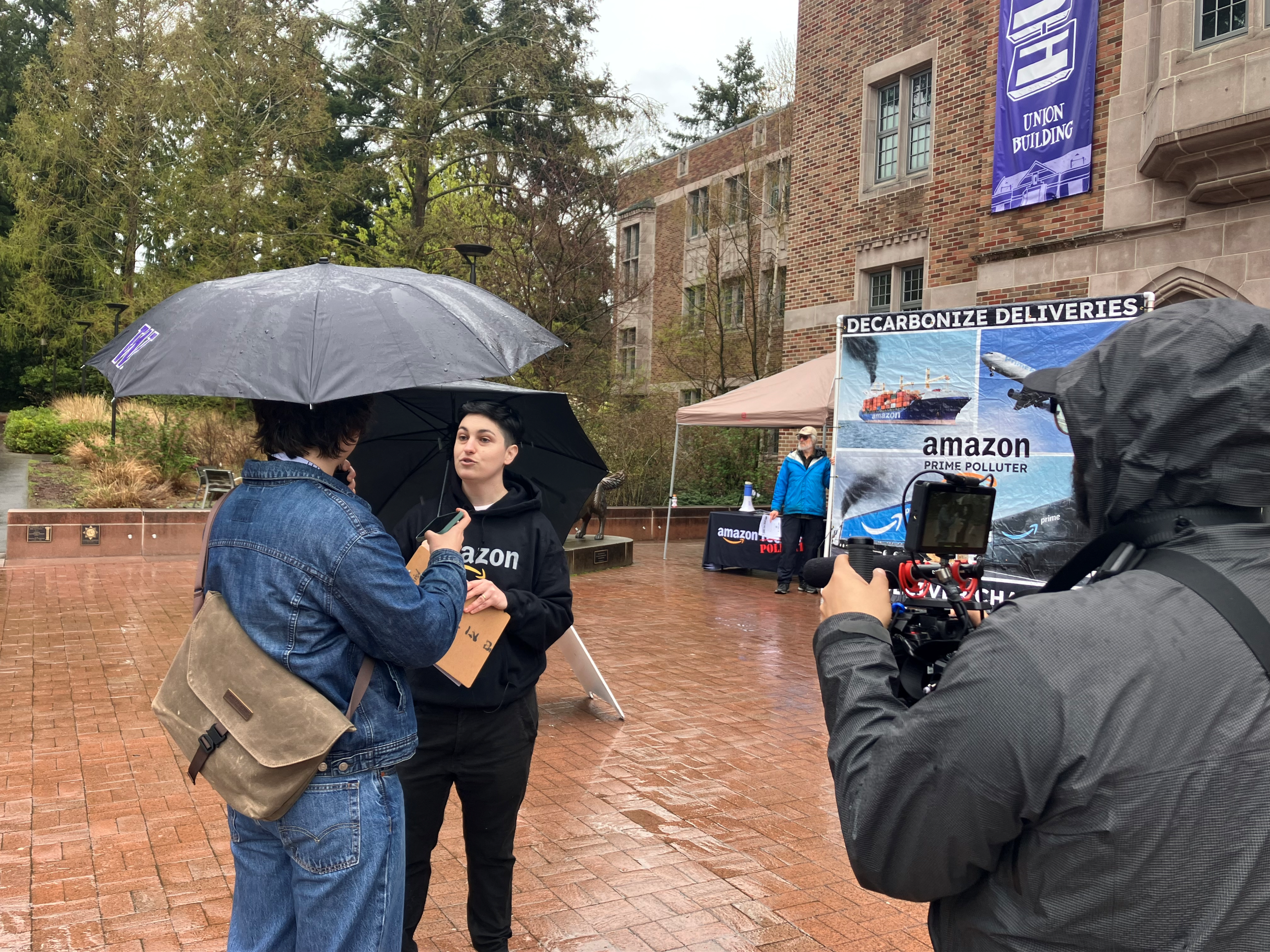


During Target Corporation’s annual general meeting, residents of the largest maritime port in the United States challenged Target’s use of heavily-polluting fossil-fueled ocean cargo ships and called on the company to transition to zero-emissions cargo ships by 2030. You can see the full statements below, submitted to Target from Ship It Zero coalition members.
Statement from Naya Shah
Good morning,
My name is Naya Shah and I live in Long Beach, CA, home to the largest port in the United States.
Target cares deeply about climate change, sustainability and issues of equity, justice and public health. Target’s retail industry-leading “Target Forward” initiative sets policy and science-based targets for emissions reductions. Target is clearly committed to set a high standard and use its size and scale to drive change throughout its supply chain.
Yet Target ships billions of dollars of merchandise across thousands of miles of ocean on cargo ships that pollute our air, water, climate, and communities. Communities like Long Beach.
- Cargo ships pollute our climate by burning huge volumes of highly polluting fossil fuel.
- Cargo ships pollute our air, spewing Carbon Dioxide, Sulphur Dioxide, Nitrous Oxide, Black Carbon and Chemicals that cause cancer.
- Cargo ships pollute our oceans by dumping waste, biocides and oil.
- And cargo ships pollute the lungs of people living in port communities.
Target’s continued inaction on addressing the pollution from maritime cargo shipping in its supply chain contradicts these core corporate values. The Ship It Zero Coalition calls on Target to publicly commit to:
- End Port Pollution Now: Use clean energy and electrification in major ports.
- Abandon Dirty Ships: Stop moving products on fossil-fueled ships.
- Put Zero at the Helm: Commit to 100% zero-emission shipping by 2030.
Target’s competitors, such as Amazon and IKEA, have made initial commitments to decarbonize the ocean shipping in their supply chains.
Why hasn’t Target committed to zero emissions ocean shipping by 2030?
Statement from Jayden Maree
Good morning! My name is Jayden Maree and I live in Long Beach, CA.
Target’s maritime shipping impacts our air, water, climate and port communities.
Living near the Port in Long Beach, CA, I see the giant container ships spewing smoke and pollution that I breathe in.
The massive cargo ships loaded with merchandise bound for Target retail stores emit tens of thousands of metric tons of air pollutants annually, including Sulphur Dioxide, Nitrous Oxide, black carbon, and carbon monoxide. These pollutants put the health of port communities at risk, with increased rates of premature deaths from cancer and cardiovascular disease, as well as childhood asthma. Children in communities like Long Beach are among the most vulnerable to the health impacts of air pollution exposure. And it’s most often working class Black and Brown communities that pay the biggest price.
The technology for zero emissions shipping exists, but needs to be brought to scale. That requires demand for renewables, and an investment. It requires leadership. Target’s lack of leadership today is an injustice to the leaders of tomorrow.
When will Target prioritize the health of port communities by committing to immediately reduce and completely eliminate maritime shipping emissions no later than 2030?
Statement from Dr. Heather Price
Good morning!
My name is Dr. Heather Price and I earned my PhD in chemistry and conducted my postdoctoral research with the UW Program on Climate Change. I currently teach chemistry and lead the Climate Justice Across the Curriculum project at North Seattle College.
People are already being harmed and killed by fossil fueled climate change and air pollution. We must rapidly phase out the use of fossil fuels that cause deadly local air pollution and heat our planet into dangerous temperature ranges.
Target should be leading efforts to phase out the use of fossil fuels in its maritime shipping and drive the investment and a transition to the zero emissions fuels and technologies for marine vessels that are so urgently needed. The Intergovernmental Panel on Climate change has made clear that all sectors, including the heavily-polluting international shipping industry, must immediately begin to slash climate disrupting emissions if we are to avoid the worst impacts of climate change. All businesses and companies, including Target Corporation, have a vital role to play in protecting our health and our future from the impacts of climate change.
The solution is for Target to publicly commit to:
- End Port Pollution Now: Use clean energy and electrification in major ports.
- Abandon Dirty Ships: Stop moving products on fossil-fueled ships.
- Put Zero at the Helm: Commit to 100% zero-emission shipping by 2030.
Time is of the essence and the science is clear. The world must stop burning gas, oil and coal to save as many lives as possible from the deadly impacts of fossil fueled climate change. Impacts from fossil fueled climate change are already harming people today and are getting worse. Target must focus on transitioning to renewable sources of energy as quickly as possible. Currently, Target is driving demand for fossil fuels and making the problem worse. It’s time for Target to be part of the solution. It’s time for Target to address its maritime shipping, commit to ending port pollution and come up with a plan for 100% zero emission shipping by 2030 or sooner.
Why haven’t Target’s climate commitments addressed its maritime shipping, and when will Target commit to ending port pollution and to 100% zero emissions maritime shipping by 2030?

Recent Updates








